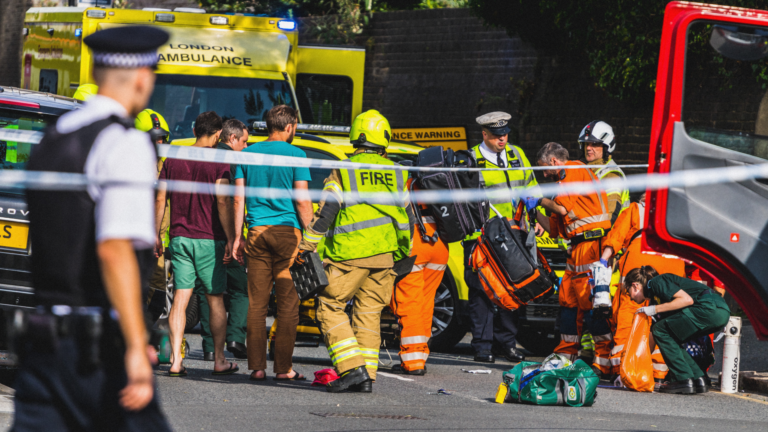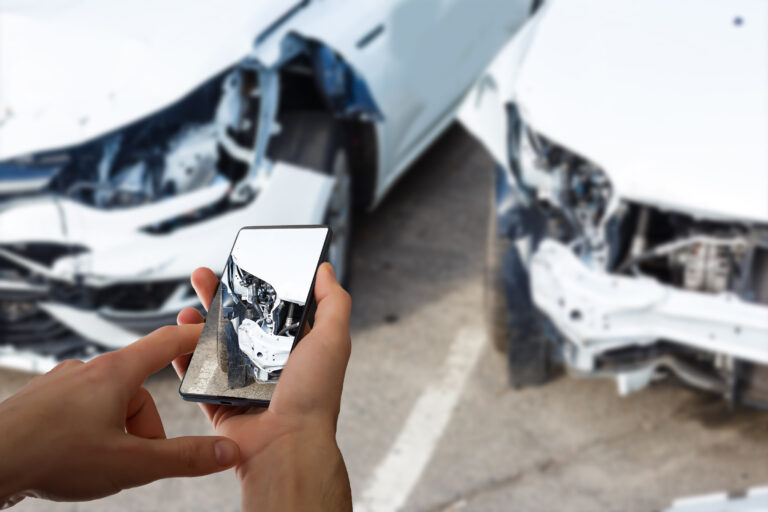Rear-ended in Atlanta? Our local rear-end car accident lawyers know Fulton and DeKalb courts and the insurance adjusters you’ll face. We build strong claims using police crash reports, EDR “black box” data, and video to prove liability and maximize your compensation. Free consultation, available 24/7. No win, no fee.
Get Your Free Consultation Today
Call us 24/7 at 866-4-LAW-411 or fill out our form. No fees unless we win your case.
Why Hire a Rear-End Car Accident Lawyer in Atlanta?
Local Experience in Fulton & DeKalb Courts
We know Atlanta. We know Fulton County and DeKalb County courts. More importantly, we know the judges, insurance adjusters, and defense lawyers who handle these cases every day. This local experience helps us get better results for your personal injury claim.
No Win, No Fee Contingency Representation
Money shouldn’t stop you from getting help. That’s why we work on a contingency fee. You pay nothing upfront. We only get paid if we win your case. No win, no fee. It’s that simple.
Georgia Traffic Laws and Insurer Playbooks
Georgia law has specific rules about rear-end accidents. We know O.C.G.A. § 40-6-49 (following too closely) inside and out. We understand how local judges apply these laws and how insurance companies try to dodge them.
Results in Rear-End Settlements and Verdicts
We’ve helped hundreds of rear-end accident victims get fair compensation. From whiplash cases to serious spinal injuries, we know what your case is worth and how to get it.
What to Do After a Rear-End Collision in Atlanta
911, Medical Care, and Safety Steps
First things first —
get safe. If you can move your car, pull over. Call 911 right away. Even if you feel okay, get checked by a doctor. Many injuries like whiplash or concussion don’t show up right away.
- Move to safety and call 911
- Get medical evaluation within 24-72 hours
- Photograph vehicles, scene, and injuries
- Get witness info and the Georgia crash report number
- Contact a lawyer before any recorded statement
Georgia Uniform Motor Vehicle Accident Report and Scene Documentation
Take photos of everything — your car, their car, the road, skid marks. Get names and numbers from witnesses. Make sure police file a Georgia Uniform Motor Vehicle Accident Report. This police crash report becomes key evidence for proving liability.
Preserve EDR, Dashcam/CCTV, and Vehicle Evidence
Modern cars have an event data recorder (EDR)/black box that records crash data. Dashcam/CCTV footage from nearby businesses can show what happened. Many businesses overwrite CCTV in 7-30 days. We send immediate spoliation letters to preserve this evidence before it disappears. Spoliation letters/subpoenas to phone carriers preserve call/text logs.
Avoid Adjuster Traps; See a Doctor Within 72 Hours
The insurance adjuster will call you fast. They want a recorded statement. Don’t give one without talking to us first. Never admit fault, even if you’re being polite. See a doctor within 72 hours — insurance companies use delays against you.
When to contact a lawyer and what to bring to a consultation
Call us as soon as possible. What to bring to your consultation:
- Georgia crash report and claim numbers
- Photos/video, dashcam footage, EDR data (if available)
- Medical records/bills and insurance cards
- Pay stubs/tax returns for wage loss
- Auto policy info (UM/UIM, MedPay) and any correspondence from insurers
Fault in Georgia Rear-End Crashes (O.C.G.A. § 40-6-49)
Negligence Per Se and Proving Causation
Georgia law O.C.G.A. § 40-6-49 says drivers must keep a safe distance. When someone hits you from behind, they’ve broken this law. That’s called negligence per se — it establishes breach of duty, but you still must prove causation and damages. Insurers may still argue causation or comparative fault.
Evidence: Police Report, Damage Patterns, EDR, Cell-Phone Records
We gather all the evidence: police reports, damage patterns, EDR data, video footage, and cell-phone records (to prove texting while driving). Our accident reconstruction experts can show exactly how the crash happened.
Defenses: Sudden Stop, Brake Failure, Multiple Impacts
Sometimes the other driver claims you stopped suddenly or your brake lights didn’t work. They may argue brake failure/defect defenses or blame chain-reaction/multiple-impact crashes. We know how to fight these defenses using evidence like EDR and reconstruction to allocate fault across vehicles.
Comparative Negligence (O.C.G.A. § 51-12-33)
Under O.C.G.A. § 51-12-33, Georgia uses comparative negligence. If you’re less than 50% at fault, you can still recover damages. Your compensation gets reduced by your percentage of fault. We fight to keep your fault percentage as low as possible.
Injuries from Rear-End Collisions
Whiplash and Herniated Discs
Whiplash is the most common rear-end injury. Your neck snaps back and forth, damaging muscles and ligaments. More serious crashes can cause herniated discs that need surgery.
Concussions/TBI and Delayed Symptoms
Your brain can slam against your skull even without hitting anything. Concussion/TBI symptoms include headaches, confusion, and memory problems. Many injuries don’t hurt right away. Adrenaline masks pain. That’s why follow-up care matters so much for your health and your claim.
Back, Soft-Tissue, and Seatbelt/Airbag Injuries
The force of impact can hurt your entire spine. Soft-tissue injuries to muscles and tendons cause ongoing pain that affects your whole life. Seatbelts save lives but can cause injuries too. Same with airbags. Knees often hit the dashboard. Shoulders get wrenched by the seatbelt.
Compensation in a Georgia Rear-End Claim
Medical Bills Now and Future Care
All your medical bills are covered:
- Medical bills (ER, imaging, PT/chiro, surgery) and future care
- Lost wages and diminished earning capacity
- Pain and suffering; loss of enjoyment; loss of consortium
- Property damage, rental car, and diminished value
- Punitive damages in DUI/reckless cases
Property Damage, Rental Car, Diminished Value
We get your car fixed or replaced. You get a rental car while yours is in the shop. Georgia also allows diminished value claims — compensation because your car is worth less after the accident. Insurers use the 17c formula, but Georgia law allows challenging low DV calculations with independent appraisals.
Pain and Suffering, Loss of Consortium
You deserve compensation for your pain, both physical and emotional. If injuries affect your marriage, your spouse can claim loss of consortium.
Lost Wages and Earning Capacity
We recover your lost wages and benefits. If you can’t earn as much in the future, we fight for that lost earning capacity too.
Punitive Damages in DUI/Reckless Cases
If the other driver was drunk or extremely reckless, you might get punitive damages — extra money to punish bad behavior.
MedPay and Medical Liens/Subrogation
Your medical payments coverage (MedPay) pays regardless of fault and may be subject to subrogation depending on plan language. We handle subrogation and negotiate reductions on medical liens to increase your net recovery.
Don’t Wait — Georgia Has Time Limits
The statute of limitations gives you just 2 years for injury claims. Call 866-4-LAW-411 now for your free case review.
Insurance Company Tactics and Bad-Faith Leverage
Low-Ball Offers and Recorded Statements
Insurance adjusters seem friendly, but they work for the insurance company, not you. They offer quick, low settlements hoping you’ll take them before knowing your case’s real value. Adjusters twist your words from recorded statements. They rush you to settle before you know how badly you’re hurt. Don’t fall for these traps.
UM/UIM Claims When Coverage Is Limited
If the other driver lacks insurance or doesn’t have enough, your uninsured/underinsured motorist (UM/UIM) coverage kicks in. We know how to maximize these claims.
Time-Limited Demands (O.C.G.A. § 9-11-67.1) and Holt
We use Georgia’s time-limited policy-limits demands under O.C.G.A. § 9-11-67.1 strategically. A proper Holt demand can set up bad-faith exposure, giving us leverage to get you full compensation.
Georgia Laws and Deadlines
Statute of Limitations (O.C.G.A. § 9-3-33)
O.C.G.A. § 9-3-33 gives you two years for personal injury claims, four years for property damage. Don’t wait — evidence disappears and witnesses forget.
Accident Reporting (O.C.G.A. § 40-6-273)
O.C.G.A. § 40-6-273 requires reporting accidents with injuries or major damage. Georgia’s at-fault system means the responsible driver’s insurance pays.
Seat Belt Evidence Limits (O.C.G.A. § 40-8-76.1)
O.C.G.A. § 40-8-76.1 limits how seat belt non-use can be used against you. We know these rules and protect you from unfair blame.
UM/UIM & Hit-and-Run Rear-End Crashes
Notice Requirements and Prompt Police Reports
Your UM/UIM coverage protects you when the at-fault driver can’t pay. Hit-and-run claims require prompt police reporting and timely notice to your UM carrier “as soon as practicable” to avoid denial. We make sure you don’t miss these strict deadlines.
Stacking and Add-On vs. Reduced-By Coverage
You might have more coverage than you think. We look at all policies in your household and stack coverage when possible. We help you understand whether you have add-on or reduced-by coverage and maximize your recovery.
Property Damage: Repairs, Rental, and Diminished Value
Getting your car repaired or totaled out
We make sure you get quality repairs or fair value if your car is totaled. No shortcuts or used parts unless you agree.
Securing a comparable rental vehicle
You deserve a rental car similar to yours, not a tiny economy car. We fight for appropriate transportation.
Pursuing diminished value claims unique to Georgia
Georgia law recognizes your car loses value after an accident. Insurers often use the 17c formula to lowball diminished value. Georgia law allows challenging these low DV calculations with independent appraisals. We pursue these claims to get you fully compensated.
Our Process and Timeline
Free consultation and case evaluation
We start with a free consultation. We listen to your story, review your evidence, and give you honest advice about your case.
Investigation and evidence gathering
We dig deep: EDR data, phone records, expert analysis. Every piece of evidence makes your case stronger. We send immediate spoliation letters since many businesses overwrite CCTV in 7-30 days.
Medical documentation, liens, and letters of protection
We work with your doctors to document injuries fully. Letters of protection let you get treatment now and pay from your settlement.
Demand, negotiation, and settlement strategy
We send a powerful demand package showing exactly what you’re owed. We use time-limited demands under O.C.G.A. § 9-11-67.1 when appropriate to create bad-faith leverage. Then we negotiate hard for maximum compensation.
Filing a lawsuit and taking your case to trial if needed
If the insurance company won’t be fair, we file suit. We’re ready for trial and they know it.
What affects case duration
Injury severity, treatment length, liability disputes, and insurer tactics all affect timing. Simple cases might settle in months. Complex cases can take a year or more.
Typical stages from claim to resolution and when litigation makes sense
Most cases follow this path: treatment, investigation, demand, negotiation, settlement. If insurers won’t be fair, we file suit and push toward trial.
Fees and Costs: No Upfront Fees
Contingency fee explained
Our contingency fee is a percentage of what we recover. No recovery, no fee. It’s that simple.
No upfront costs
You pay nothing to start your case. We cover all costs and get reimbursed only if we win.
Case expenses, liens, and what you owe if we win vs. if we don’t
If we win, case expenses come from your settlement. If we don’t win, you owe nothing. We take the risk, not you.
FAQs
Nothing upfront. We work on contingency — you only pay if we win your case.
No. We cover all costs and get paid only from your settlement or verdict.
Most cases settle in 3-12 months. Complex cases or those going to trial can take longer.
Medical bills, lost wages, pain and suffering, property damage, and sometimes punitive damages.
Call 911, get medical care, document everything, and contact a lawyer before talking to insurance.
The rear driver is usually at fault for following too closely. Evidence like police reports and EDR data proves it.
Yes, if you’re less than 50% at fault. Your compensation gets reduced by your fault percentage.
Don’t take it. Early offers are always too low. Talk to us first.
Police reports, medical records, photos, witness info, and proof of damages.
Most cases settle without trial. But we’re ready for court if needed.
Every case is different. Settlements range from thousands to hundreds of thousands depending on severity.
Yes. Low-speed impacts can still cause serious injuries like whiplash or concussions.
Even “minor” crashes can have major consequences. A lawyer ensures you get full compensation.
Georgia is not a no-fault state — the at-fault driver’s insurance pays. MedPay can cover bills immediately while we pursue your claim. We coordinate coverage to maximize your recovery.
Yes. Rideshare and commercial vehicles often have higher insurance limits and additional coverage layers. Different rules and deadlines may apply. We know how to navigate these complex claims.
Policy limits cap what insurance pays. A proper Holt demand can open up bad-faith claims for amounts above limits. Yes, we can pursue the driver personally, though collection depends on their assets.
Free Consultation — Start Your Claim Today
Call or submit the form to start your case review
Don’t wait. Evidence disappears. Witnesses forget. The statute of limitations runs out. Call us now at 866-4-LAW-411 or fill out our online form for your free consultation.
What to bring to your consultation
- Georgia crash report and claim numbers
- Photos/video, dashcam footage, EDR data (if available)
- Medical records/bills and insurance cards
- Pay stubs/tax returns for wage loss
- Auto policy info (UM/UIM, MedPay) and any correspondence from insurers
Get Started Today — We’re Here 24/7
You’ve been through enough. Let us fight for you. No fees unless we win.
External Resources
- O.C.G.A. § 51-12-33 – Comparative Negligence (Georgia Code)
- O.C.G.A. § 9-3-33 – Statute of Limitations for Injuries
- O.C.G.A. § 40-6-49 – Following Too Closely
- O.C.G.A. § 40-6-273 – Duty to Report Accidents
- National Highway Traffic Safety Administration (NHTSA) – Rear-End Crashes and Safety
- Insurance Information Institute – How the Claim Process Works





